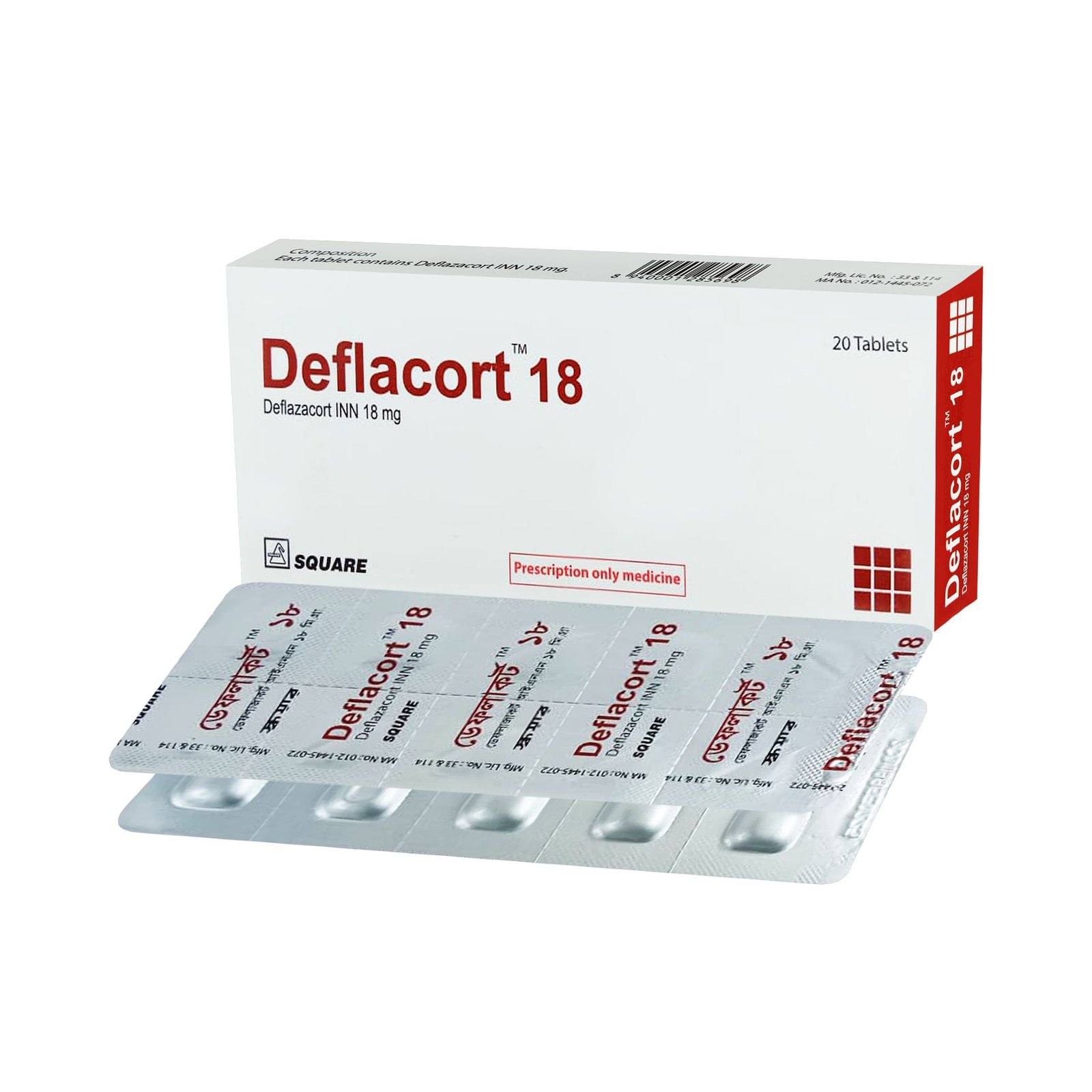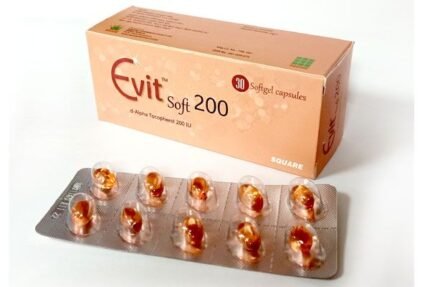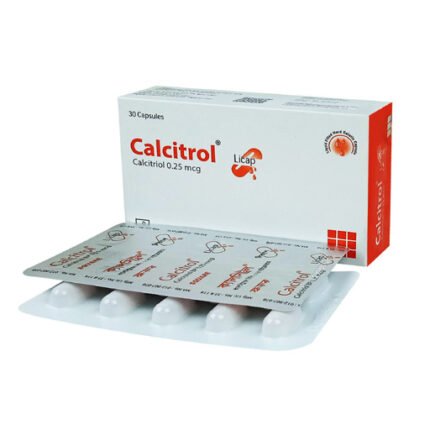Deflacort 18
200.00৳ Strip
Deflacort is a potent glucocorticoid medication used to treat a wide range of inflammatory and autoimmune conditions, including asthma, rheumatoid arthritis, and lupus. By inhibiting the Phospholipase A2 enzyme and modulating immune system chemicals, Deflacort provides anti-inflammatory and immunosuppressive effects. Its dosage varies depending on the condition and patient age, with careful monitoring to minimize side effects. It’s contraindicated in hypersensitivity cases and caution is advised in various medical conditions.
 Brand
Brand
|
Square Pharmaceuticals PLC |
|---|---|
 Generics
Generics
|
Deflazacort |
Indications:
Deflacort is prescribed for a range of conditions including:
- Management of Anaphylaxis, Asthma, and Severe Hypersensitivity Reactions
- Treatment of Rheumatoid Arthritis, Juvenile Chronic Arthritis, and Polymyalgia Rheumatica
- Addressing Systemic Lupus Erythematosus, Dermatomyositis, and Mixed Connective Tissue Disease (excluding systemic sclerosis), Polyarteritis Nodosa, and Sarcoidosis
- Managing Pemphigus, Bullous Pemphigoid, and Pyoderma Gangrenosum
- Addressing Minimal Change Nephrotic Syndrome and Acute Interstitial Nephritis
- Treatment for Rheumatic Carditis
- Management of Ulcerative Colitis and Crohn’s Disease
- Treating Uveitis and Optic Neuritis
- Addressing Autoimmune Hemolytic Anemia and Idiopathic Thrombocytopenic Purpura
- Management of Acute and Lymphatic Leukemia, Malignant Lymphoma, and Multiple Myeloma
- Immune Suppression in Transplantation
Pharmacology:
Deflazacort exerts its anti-inflammatory effects by inhibiting the Phospholipase A2 enzyme responsible for prostaglandin synthesis. Additionally, it reduces the release of specific immune system chemicals, thereby providing immunosuppressive action.
Dosage & Administration:
For Adults:
- Acute Disorders: Initial doses of up to 120 mg/day may be required, with maintenance doses typically ranging from 3-18 mg/day.
- Rheumatoid Arthritis: Maintenance doses usually range from 3-18 mg/day, with the smallest effective dose recommended and adjustments made if necessary.
- Bronchial Asthma: During acute attacks, doses of 48-72 mg/day may be necessary, gradually reducing once the attack is controlled. For chronic asthma maintenance, titrate doses to the lowest effective level.
- Other Conditions: Dosage depends on clinical need, with starting doses estimated based on a ratio of 5 mg prednisone or prednisolone to 6 mg of Deflazacort.
For Children:
- Limited exposure in clinical trials necessitates careful dosage consideration.
- Juvenile Chronic Arthritis: Maintenance doses typically range from 0.25-1.0 mg/kg/day.
- Nephrotic Syndrome: Initial doses usually start at 1.5 mg/kg/day, followed by down titration as needed.
- Bronchial Asthma: Initial doses should be between 0.25-1.0 mg/kg on alternate days, based on potency ratios.
Withdrawal Considerations:
- Gradual dose reduction is crucial for patients receiving higher-than-physiological doses of systemic corticosteroids (>9 mg/day or equivalent) for over 3 weeks.
- Withdrawal strategy depends on the likelihood of disease relapse as corticosteroid doses are decreased.
Interaction:
Deflacort undergoes hepatic metabolism. Co-administration with liver enzyme-inducing drugs like rifampicin, carbamazepine, or phenytoin may necessitate an increase in the maintenance dose. Conversely, drugs inhibiting liver enzymes (e.g., ketoconazole) might allow for a reduction in Deflacort dosage.
Contraindications:
Avoid Deflacort in cases of hypersensitivity to its ingredients or with patients receiving live virus immunization.
Side Effects:
Common side effects include gastrointestinal disturbances, musculoskeletal issues, endocrine, neuropsychiatric, and ophthalmic effects. Fluid and electrolyte imbalances, susceptibility to infection, impaired healing, hypersensitivity reactions, skin changes (atrophy, striae, telangiectasia, acne), and cardiovascular risks like thromboembolism may occur.
Pregnancy & Lactation:
Deflazacort crosses the placenta, potentially increasing the risk of intrauterine growth retardation with prolonged use during pregnancy. While corticosteroids are excreted in breast milk, doses up to 50 mg daily are unlikely to affect the infant significantly. Higher doses may cause adrenal suppression in the infant, but the benefits of breastfeeding usually outweigh the risks.
Precautions & Warnings:
Special caution is warranted in patients with cardiac disease, hypertension, thromboembolic disorders, gastritis, ulcerative colitis, diabetes mellitus, osteoporosis, myasthenia gravis, renal insufficiency, emotional instability, epilepsy, hepatic impairment, hypothyroidism, cirrhosis, or ocular herpes simplex. Monitor patients closely for adverse effects and consider appropriate interventions.
Use in Special Populations:
In hepatically impaired patients, monitor Deflacort levels closely and adjust doses accordingly. No special precautions are necessary for renally impaired or elderly patients, but monitor for adverse effects closely due to potential increased susceptibility.
Therapeutic Class:
Deflacort belongs to the class of glucocorticoids.
Storage Conditions:
Keep Deflacort in a cool (below 25°C) and dry place, protected from light and moisture. Ensure it’s out of reach of children.













Reviews
There are no reviews yet.